presented by eSe Teatro, Parley, and ACTLab
Two Big Black Bags
Dates: August 9-11, 2019
Run time: approximately 2 hours with one, 10-minute intermission
Location: Lalie Theatre
James, an Argentine veteran of the Malvinas/Falklands War, wakes one morning to a big surprise in his living room: two big black bags containing ten million dollars. Determined to turn his life around, James embarks on an adventure from Seattle to South America. But is he willing to face the ghosts of his past in order to transform his future?
Based on an overlooked but deeply significant moment in Latin American history, this new fast-paced drama by Julieta Vitullo draws on music, movement, and magical realism to craft a universal story about the devastating effects of violence and the long and winding road to healing and redemption.
Two Big Black Bags will be presented as a scripts-in-hand, workshop production in collaboration with eSe Teatro, Parley, and ACTLab. The play will be presented in English with some spoken Spanish and music in Spanish.
Cast
Jeff Allen Pierce
Jon Diaz
Mario Martinez
Michael D. Blum
Rose Cano
Monica Cortés-Viharo
Ashley Salazar
Creative Team
Written by Julieta Vitullo
Directed by Rebecca Tourino Collinsworth
Music direction by Meg Savlov
Set Design and Build: Matthew Smith
Costumes and Props: Jessica Moreno Caycho
Original Music by Matilde Vitullo
Stage Manager: Melissa Chenoa Márquez
Producers: Rose Cano, Julieta Vitullo
A Personal Statement from the Playwright, Julieta Vitullo
I was six when the Argentine military decided to appeal to an old anti-colonial cause to incite patriotic feelings and regain popularity. The U.S.-backed military dictatorship had been in power since 1976, having left 30,000 people “disappeared.” On April 2nd, 1982 the armed forces composed mainly of young conscripted soldiers with no training, landed on the Malvinas/Falklands, an archipelago 370 miles off of Patagonia that had been occupied by the British since 1833. Our teacher forced us to support “our troops” and sing against Margaret Thatcher. I felt conflicted knowing the military had killed one of my parents’ friends, and didn’t like that the conscripted soldiers had to fight while the professionals stayed home.
Two decades later I was studying at Rutgers and had to choose a dissertation topic for my PhD in Latin American literature. The Falklands War crystallized as the most important event to have shaped my political worldview. It was a widely overlooked topic and little had been written about the literature produced in its aftermath. In the next few years, I traveled to the islands, finished my dissertation, published a book on the fictions of the war, went to the islands again, and made the award-winning documentary film La forma exacta de las islas, based on a traumatic experience I underwent following my first trip. By the time the film was released, I thought I was done with the topic.
However, some months ago an idea popped into my head: a veteran of the Malvinas who is struggling with trauma and addiction awakes to two big black bags in his living room. I thought of this for days, trying to figure out the connection between the bags, which my imagination had filled with ten million dollars, and the trauma of the war. I didn’t think I had anything else to say about the Malvinas war, and yet there I was, writing my way into a play about it. I felt a freedom I hadn’t experienced while dealing with the topic from a theoretical or autobiographical perspective. Suddenly, I had no restraints: my veteran was called James; he was an Argentine who grew up speaking English with his Irish grandma; during the war, English saved his life; he suffered a split following the trauma and was fighting with his alter ego; he met his wife during the 9/11 attacks in New York; the war memories had wrecked his mental health and he was throwing his life away; he ached to return to his wife and daughters. My plot and characters provided me with a backdrop of themes I was familiar with (terrorism, colonization, oppression, identity and language) but now I could exercise and unrestricted creative freedom to impact my audience through a live, three-dimensional and playful theatrical experience.
As a citizen of a country that carries its traumas on its collective sleeve, and an immigrant who arrived in the U.S. right before 9/11 (witnessing the collapse of the towers and the breakdown of the American psyche), I’m amazed by U.S. Americans’ ability to normalize the idea of perpetual war. There can never be too many plays about the devastating effects of war, and there can always be more stories to learn about cultures we have little knowledge of.
The Malvinas/Falklands War
The 1982 war between Argentina and Great Britain for sovereignty over a group of islands located 480 miles northeast of Cape Horn was the only war in which Argentina participated during the twentieth century, and the only one that involved civilians. Most Argentines supported the military confrontation at this moment, just as the dictatorial, genocidal regime that started it underwent its deepest crisis of legitimacy. No previous event in Argentine history had lent itself to such consensus between the military and civil society based on a sense of national belonging and identity. Eventually, Argentina’s defeat brought with it a victory insofar as it spelled the end of the dictatorship, and paved the way for a return to democracy.
Not only did the war leave about 900 Argentines dead (more than 600 career and conscripted soldiers died in the conflict and around 300 survivors committed suicide), it also left many unresolved questions soon to be addressed by a rich corpus of novels, short stories and poems. It is the playwright’s hope that Two Big Black Bags will join that body of literature in attempting to shed light on this event.
Adapted from “Malvinas / Falklands War Literature,” by Julieta Vitullo. World Literature in Spanish: An Encyclopedia. Santa Barbara, CA: Greenwood Press, 2011.
A Historical Timeline to Contextualize Two Big Black Bags
(Italics denote fictional event)
| Time | Event |
|---|---|
| 180 million years ago | Gondwana breaks up and forms the current continents, including two islands off the cost of today’s Argentina, West and East Falkland or, in Spanish, Gran Malvina and Soledad. Geologically, they are an extension of the Patagonian continental platform and fossils found link the islands to South America. The British maintain that the role of the islands during the break of Gondwana is controversial, arguing that they were part of an independent microplate originally adjacent to the Eastern Cape, South Africa. |
| 16,000 years ago | The fox-like Dusicyon avus from Patagonia and the Dusicyon australis (aka warrah wolf) separate as two distinct species. Around that time, sea levels drop and the warrah wolf travels by land to today’s Falklands. Since it’s only large mammal of the islands, the origins of the warrah were a mystery for centuries. Scientists didn’t know where it came from until studies were made in 2013. |
| 1536 & 1580 | First and second foundation of Buenos Aires by Spanish conquerors. Genocide and colonization of native peoples begin. |
| 16th-17th centuries | Amerigo Vespucci, Fernão de Magalhães, John Davis, Richard Hawkins and Sebald de Weert sail close to Patagonia, causing three European nations to later lay claim to the discovery of the islands: Spain, Great Britain and Holland. |
| 1690 | Captain John Strong makes the first recorded landing on the islands and names the sound between the two “Falklands Sound” after his sponsor Anthony Cary, 5th Viscount of Falkland. |
| 1760s | Two settlements coexist on the islands, unaware of each other: Frenchmen from the Saint-Malo region under Louis-Antoine de Bougainville in the East; Commodore John Byron and his Englishmen on the West. The English plant the Union Jack and leave. These are the first known human settlements on the islands. |
| 1767 | The Spanish take over the French settlement. |
| 1774 | The British leave their settlement in West Falklands for economic reasons. |
| 1810-11 | A revolution ensues in Buenos Aires. The Spanish abandon their settlement on the Malvinas. |
| 1816 | Argentina declares its independence from Spain. |
| 1820 | A ship from the newly independent “United Provinces of the River Plate” (later Argentina) arrives at the islands to reclaim sovereignty as part of Spain’s colonial legacy. |
| 1833 | British forces expel the Argentine officials and begin a military occupation. A small guerrilla of gauchos fails to defeat the British invaders. Argentina’s efforts to regain sovereignty are unsuccessful.
The HMS Beagle visits the Falklands for the first time. Aboard is 24-years-old Charles Darwin. Though he’s mostly unimpressed by the islands, his notes about the warrah wolf suggest he was starting to think about the development of animals in isolation. |
| 1880-90 | A British community of 1,800 people live on the islands under colonial status. |
| 1890-1982 | Argentina’s diplomatic efforts to regain control of the islands continue and the claim for sovereignty establishes itself in the educational system and in the collective consciousness as Argentina’s most important national cause. |
| 1907 | James’ Grandma, Rose, is born in West Ireland. |
| 1920 | Rose’s family emigrates to Argentina. They settle in a province northeast of Buenos Aires. She’ll marry an Irish immigrant named Walsh. Approximately half a million Irish emigrate to Argentina in 1830-1930. |
| 1930 | James’ dad is born. |
| 1960s | Argentina’s efforts result in conversations about joint ownership of the islands and, potentially, on Great Britain surrendering them. |
| 1963 | Santiago Enrique Walsh (aka James) is born in a small town northeast of Buenos Aires. |
| 1967-68 | Santiago and Grandma Rose take a road trip that Santiago/James, will later reminiscence. |
| 1976 | A military Junta overthrows Argentina’s democratic government and the most brutal dictatorship in the country’s history begins. 30,000 people are “disappeared” and many tortured, imprisoned or sent to exile. |
| 1981 | Santiago enters the mandatory military service at age 18. Service is compulsory between 1904 and 1994. A lottery system is used to match the last three numbers of young men’s national IDs with a number determining what military branch they’d join, or if they’d be exempt. |
| 1982 |
|
| Post war | Argentine ex-combatants reveal brutal abuses by their superiors during the war. |
| 2001 | On September 11, terrorists attack the World Trade Center in New York City. At 8:46am, AA flight 11 crashes into the north tower. At 9:03, UA flight 175 crashes into the south tower, between floors 77 and 85. At 9:59am, the south tower collapses; at 10:28am the north one comes down. Elisa is at her job on the 84th floor of the south tower and escapes. She and James meet. A week later, anonymous letters laced with deadly anthrax spores arrive at media companies and congressional offices. |
| 2002 | James and Elisa’s first daughter, Rose, is born. |
| 2003-04 | James and Elisa move to Seattle, where their second daughter, June, is born. |
| 2007 |
|
A Note on Argentina’s Demographics
Although viewed as the most European nation of Latin America, Argentina is a country where heterogeneity has been suppressed. Authoritarian practices have attempted to eliminate differences to fulfill the ideals of modernization and global capitalism.
Now estimated at 45 million people, Argentina’s demographics are the result of waves of European immigration, notably Italians and Spanish, between the mid nineteenth and twentieth centuries, mixed with indigenous, African and Creole populations and, most recently, other South American nationalities such as Bolivians and Paraguayans.
 Notes About Lichtenberg Figures, Mars, and the Electric Universe Theory
Notes About Lichtenberg Figures, Mars, and the Electric Universe Theory
Named after the German physicist who first identified them, Lichtenberg figures are branching tree-like patterns created by high voltage electrical discharge. They can occur in nature as a result of a lightning bolt, marking the surfaces affected by fern-like, fractal patterns. This can happen on the ground or on a person’s body.
Valles Marineris, a giant canyon in Mars five times longer than the Grand Canyon, takes the form of a Lichtenberg-like formation. This has led the proponents of the Electric Universe theory to argue that Mars was hit by tremendous electric forces (such as a giant plasma thunderbolt).
Electric Universe physicists go as far as to say that the scar on the face of the god Mars (the Roman version of Ares) is a mythical representation of an actual cosmic phenomenon that ancient peoples witnessed during a phase of high interplanetary electrical discharge activity.
[www.thunderbolts.info]eSe Teatro: Seattle Latinx Take Stage
Founded in 2010, eSe Teatro honors self-definition and inclusion, striving to represent all the colors in the “rainbow of brown” of our Latinidad. eSe Teatro explores language, shared history, and cultural roots, through adaptations of classics as well as new works and script development.
Parley, a Seattle Playwrights’ Group
Parley is a collective of Seattle playwrights committed to the long-term development of one another’s work. We provide a protected space in which to welcome the unguarded, authentic expression of our differences on the stage.
Coming soon!
This production contains strong language, depictions of torture and simulated warfare.
ACT believes that our patrons can determine what is offensive for themselves, and what is appropriate for their children. We don’t create age restrictions but do our best to offer content advisories for each show. For detailed information about show content and possible triggers, please contact communications@acttheatre.org.
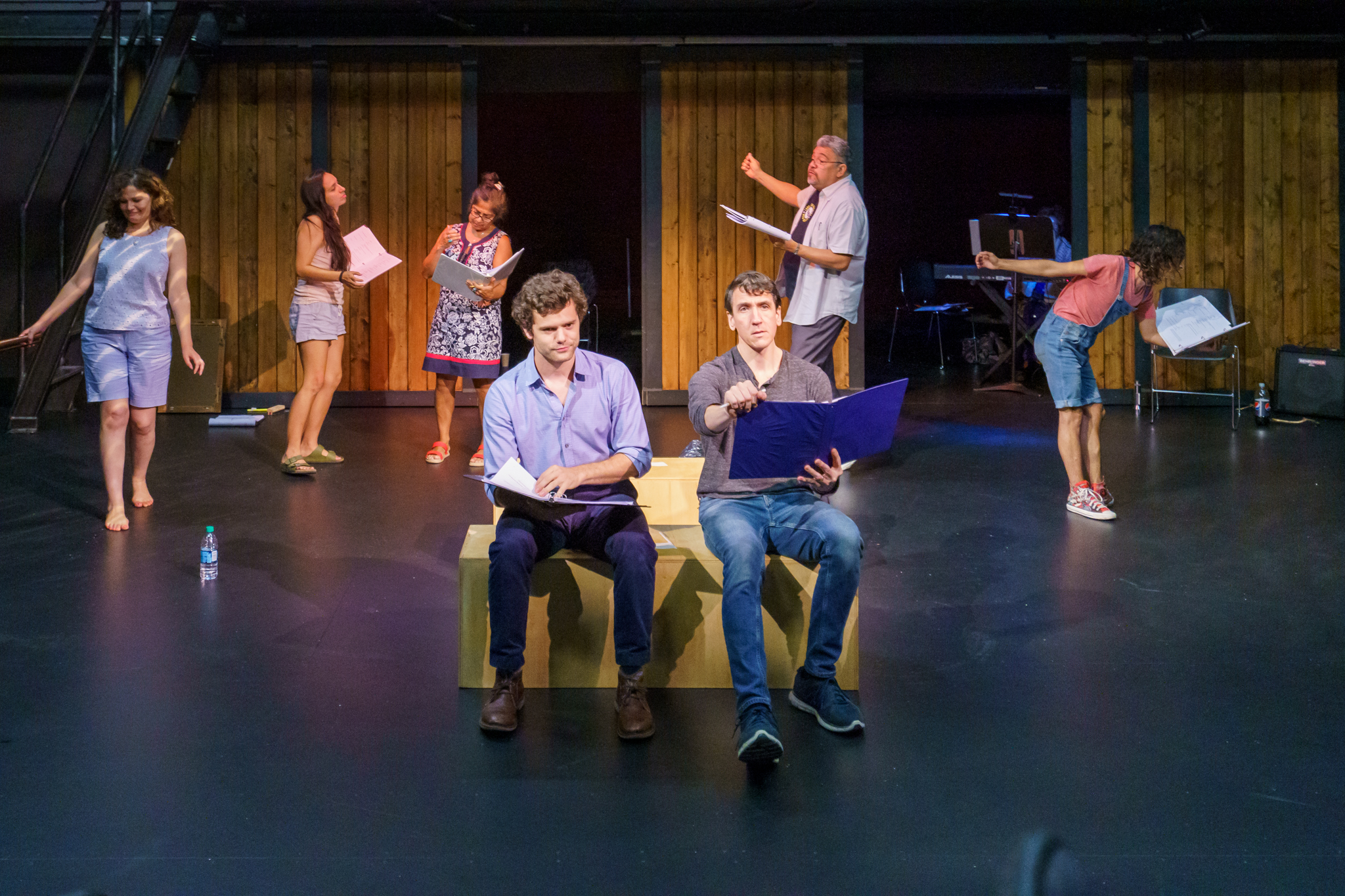
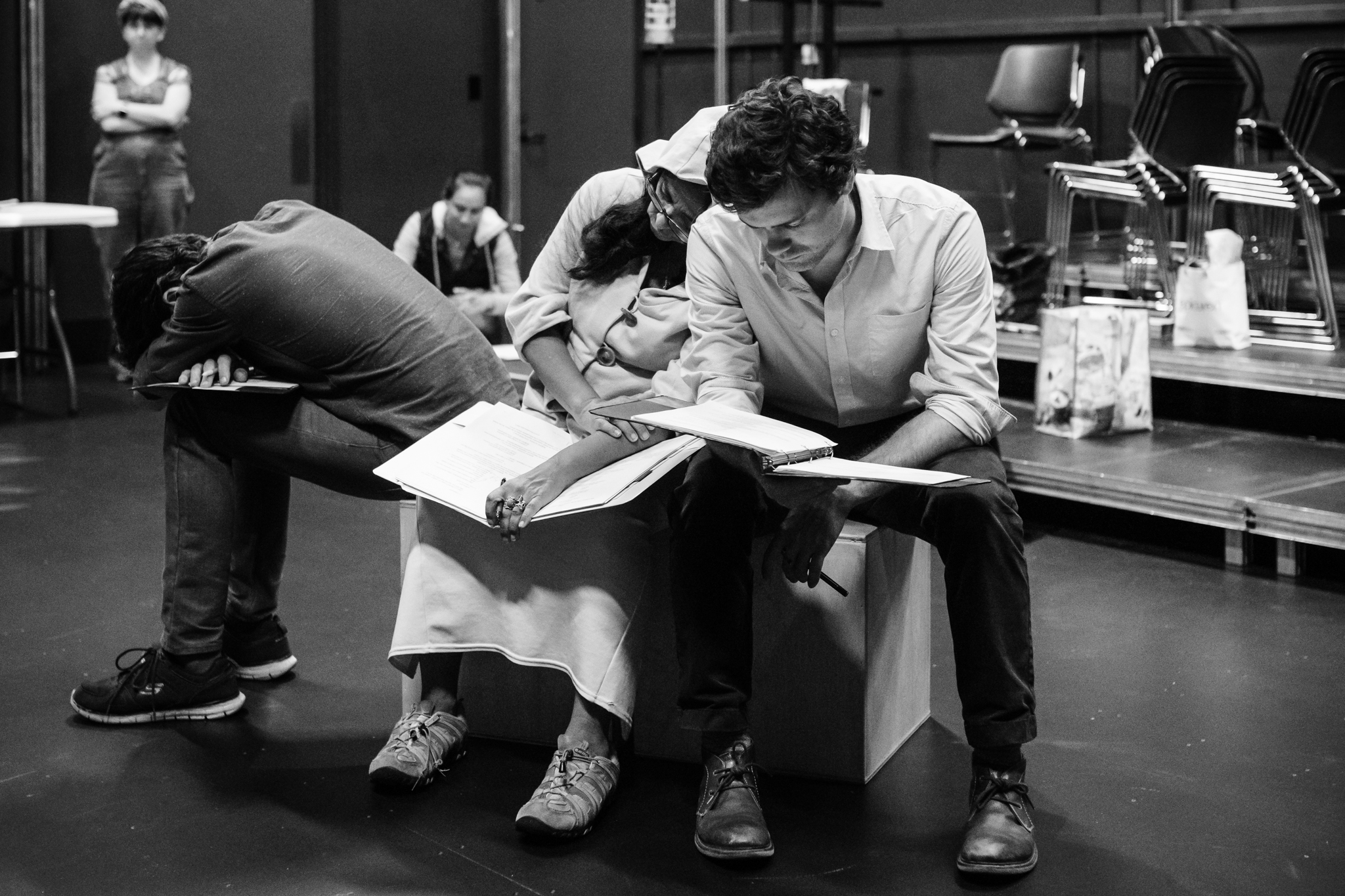
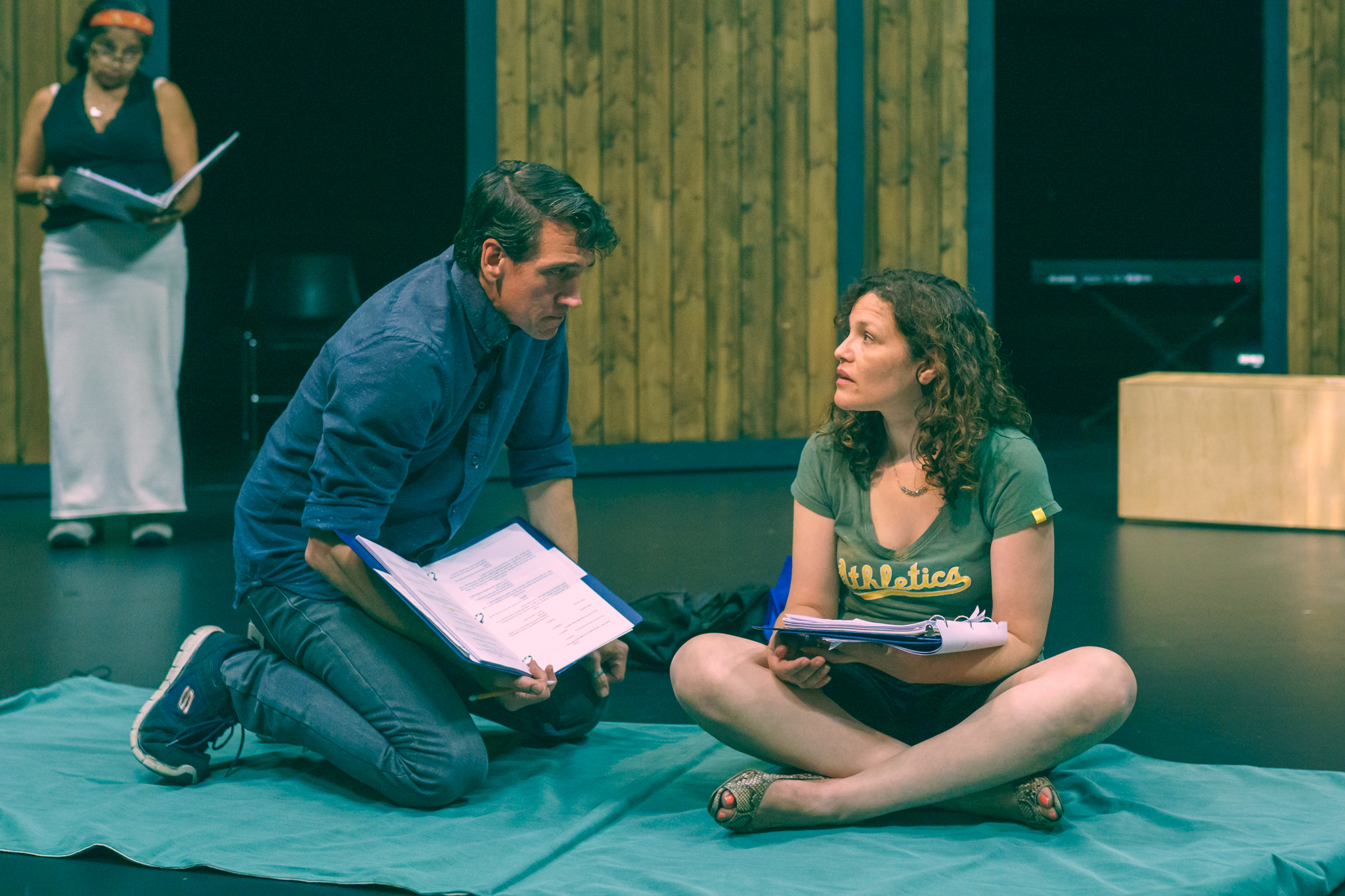
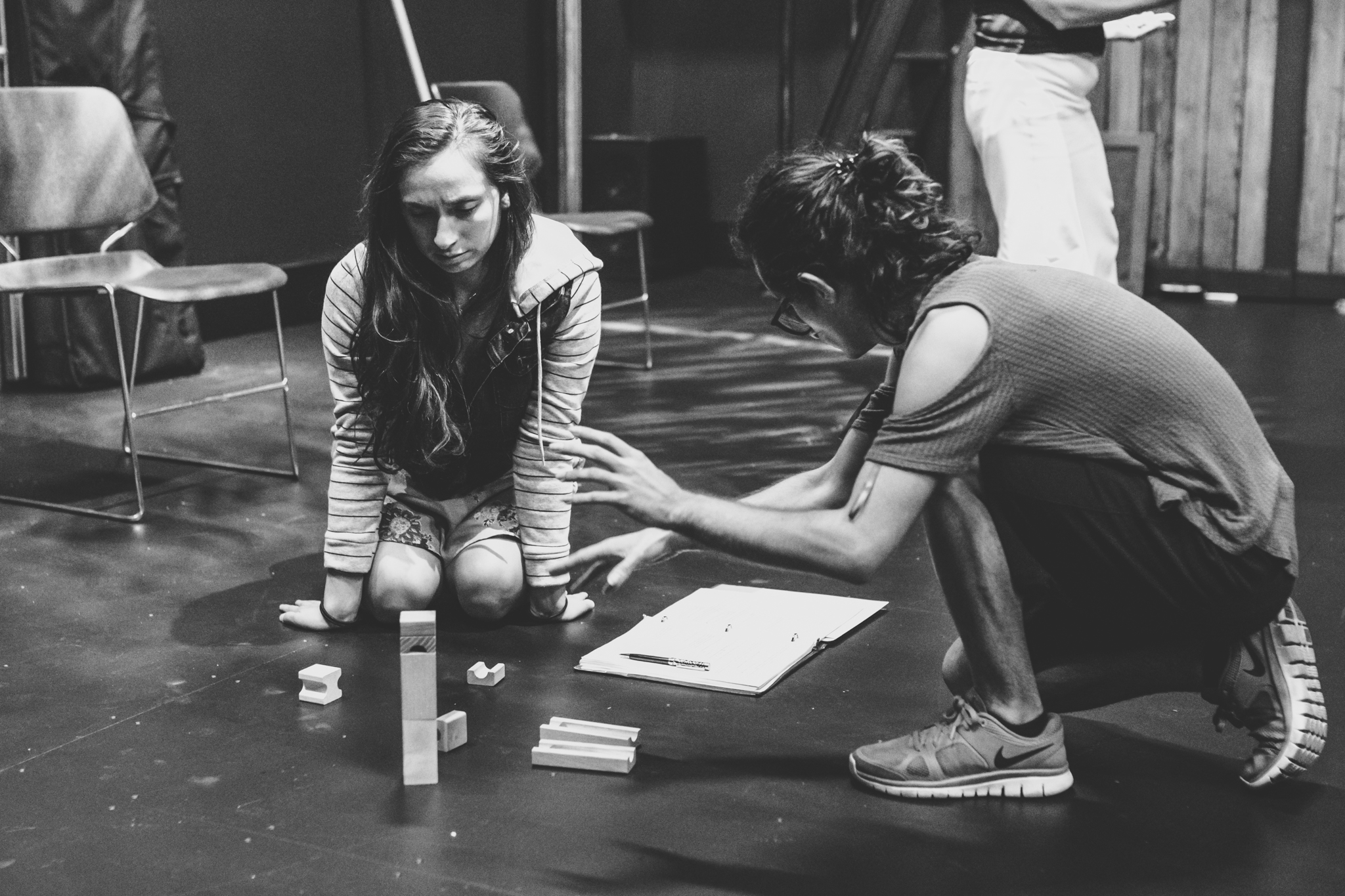
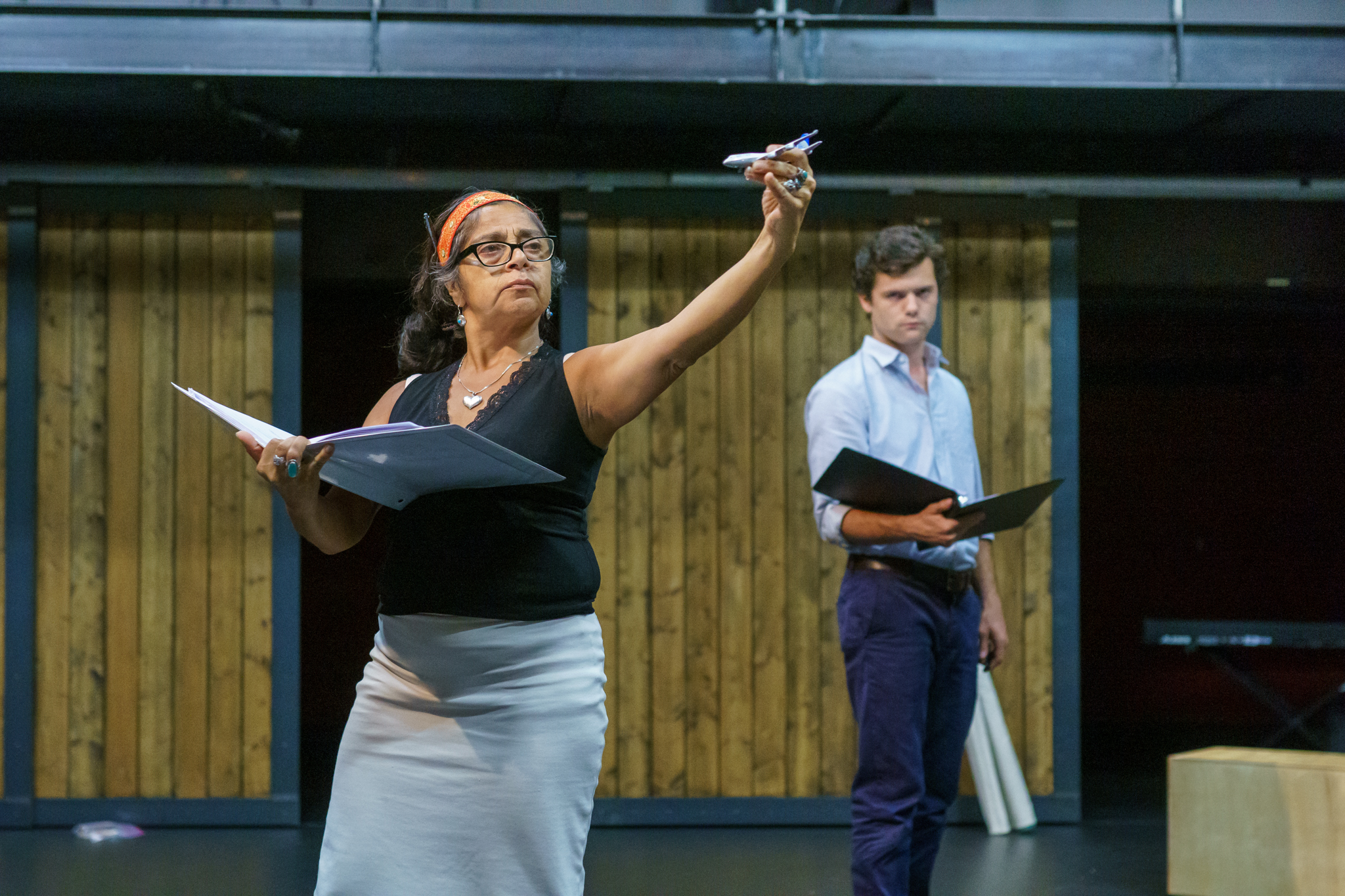
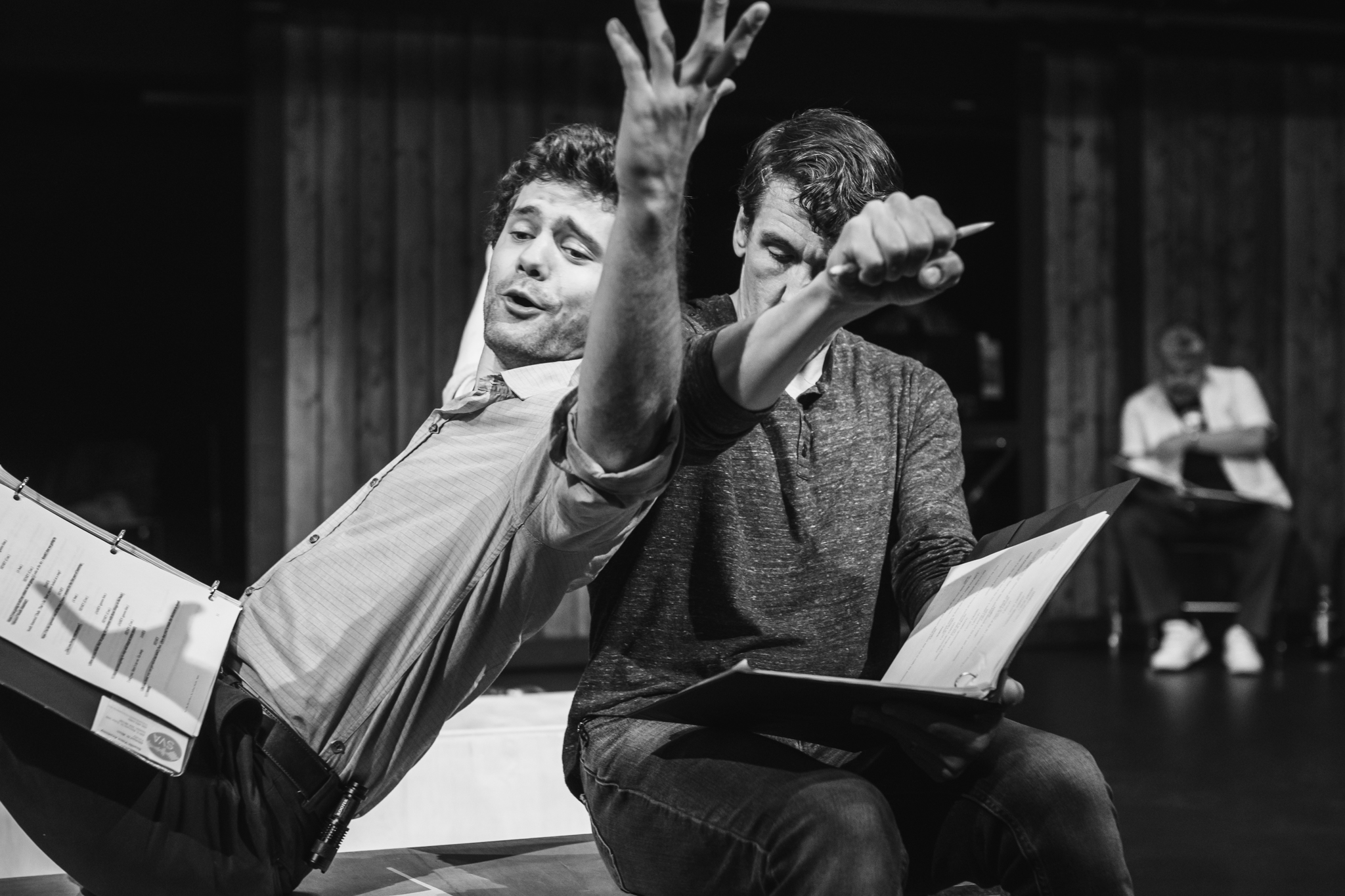
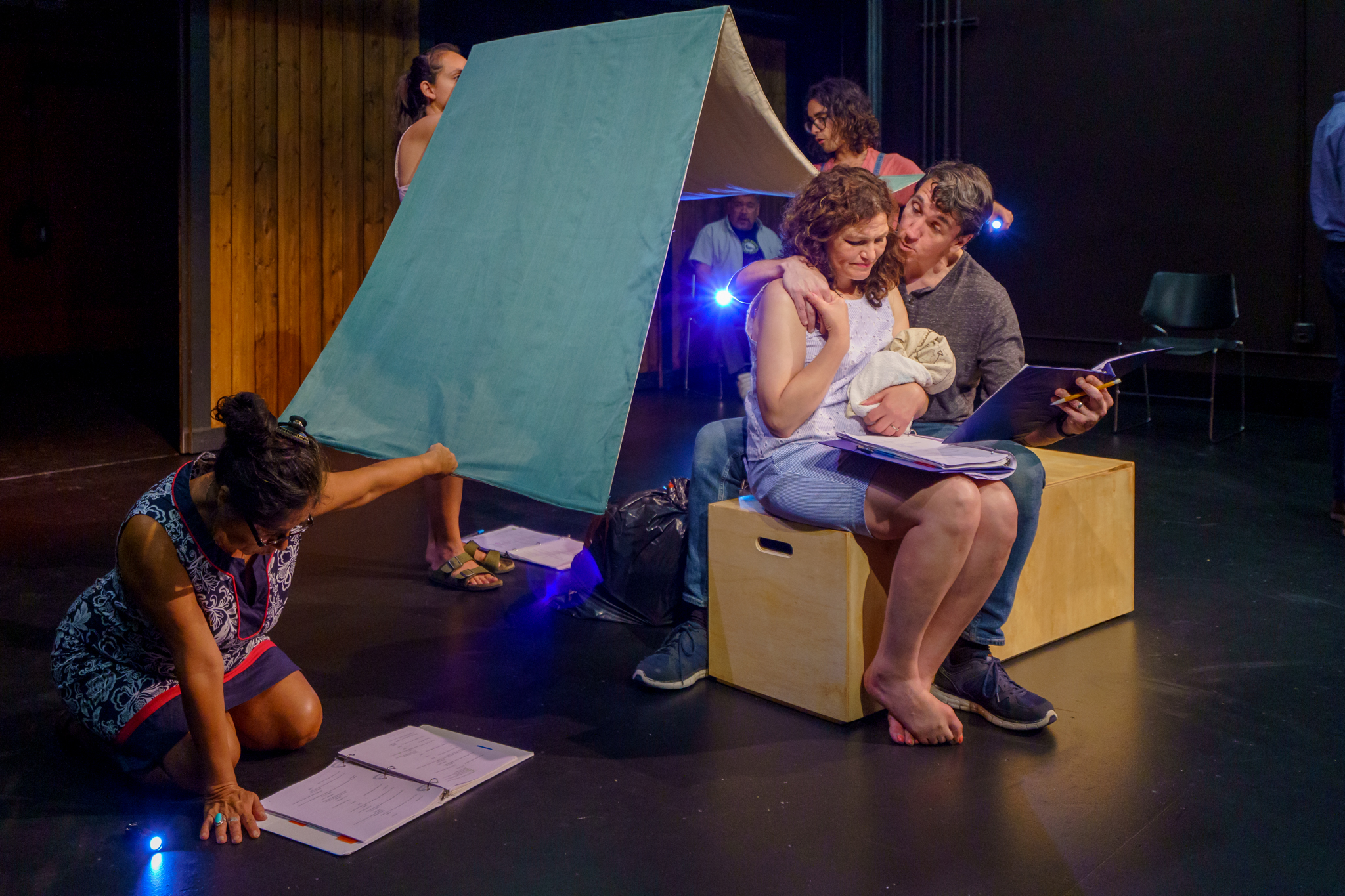
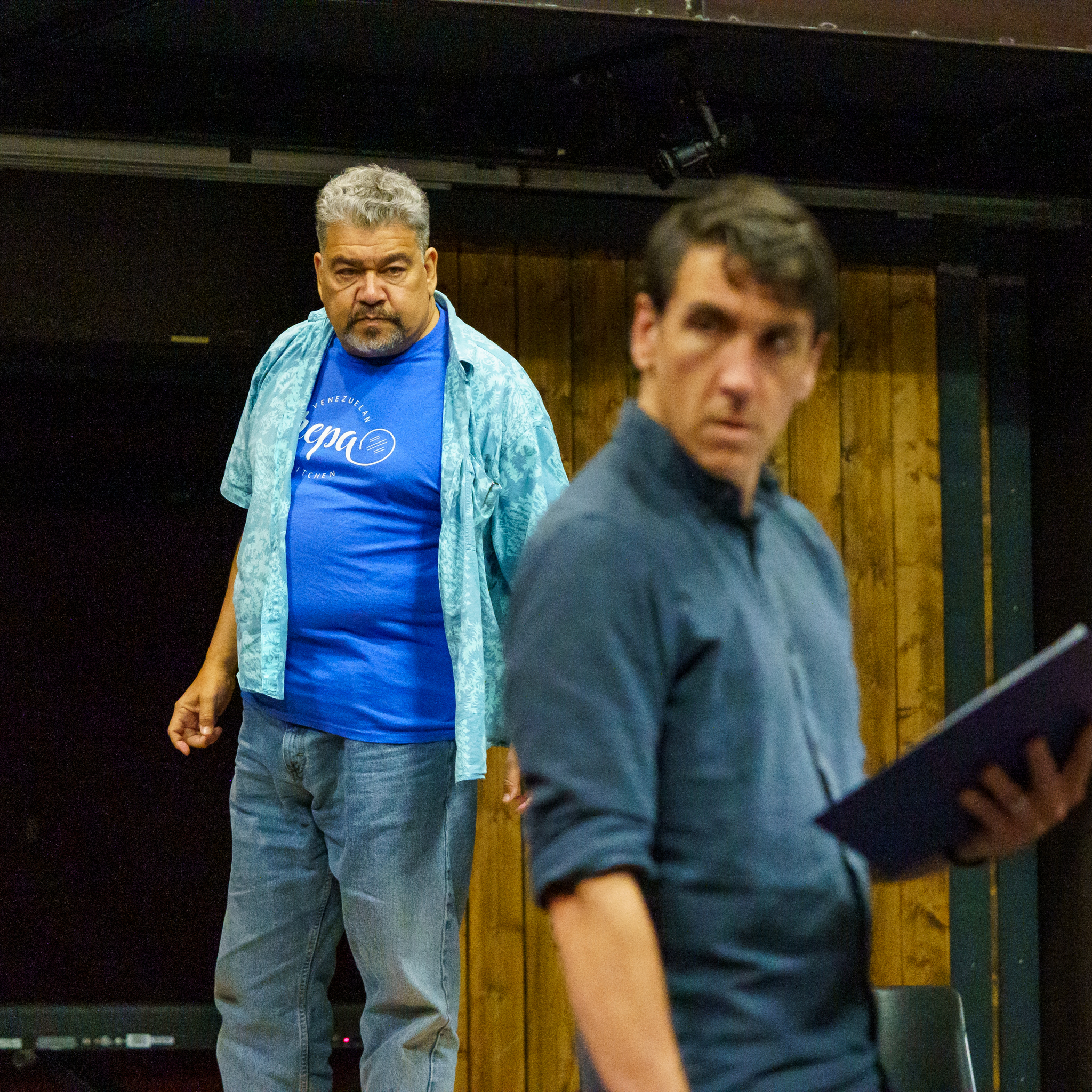
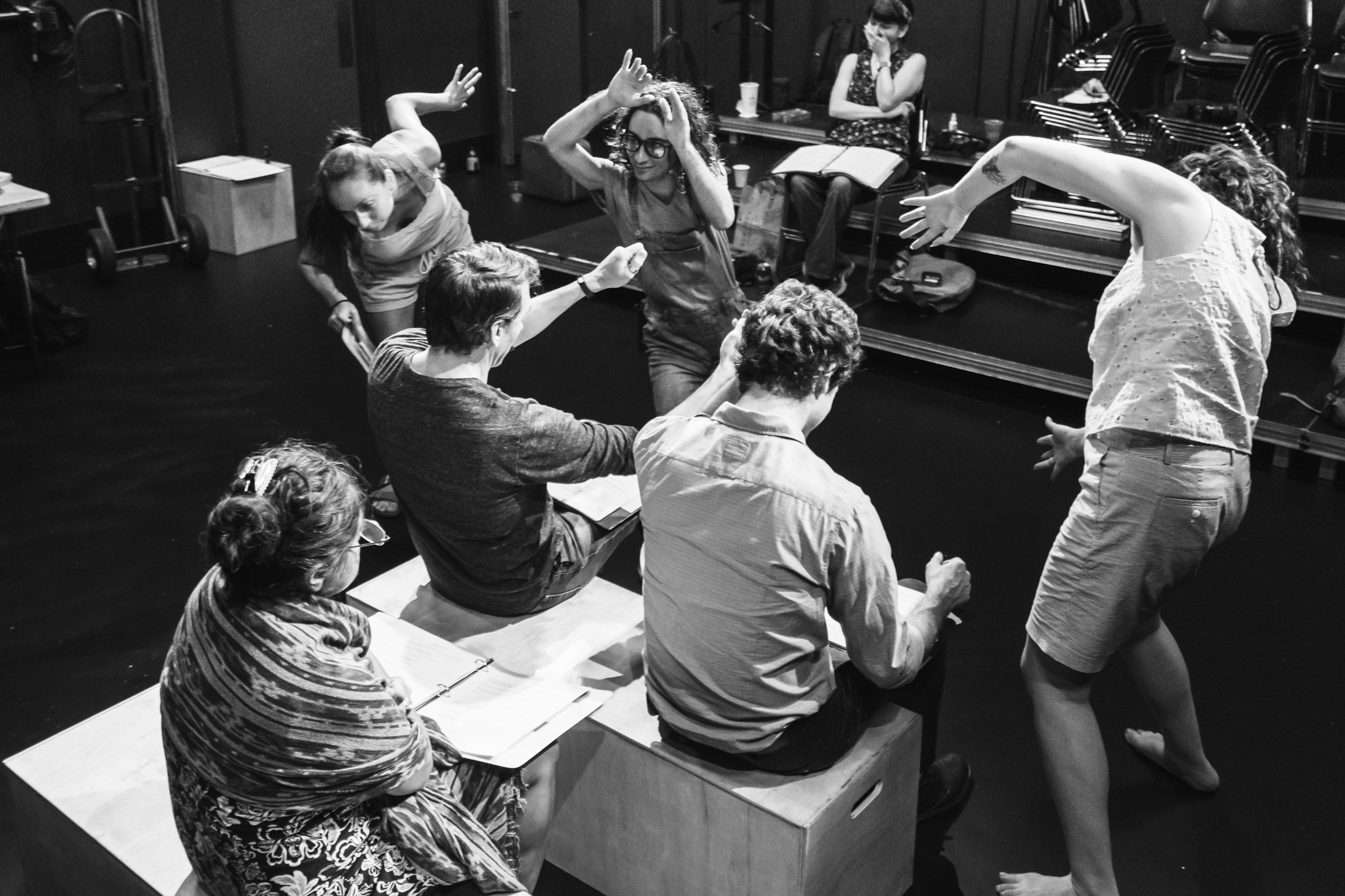
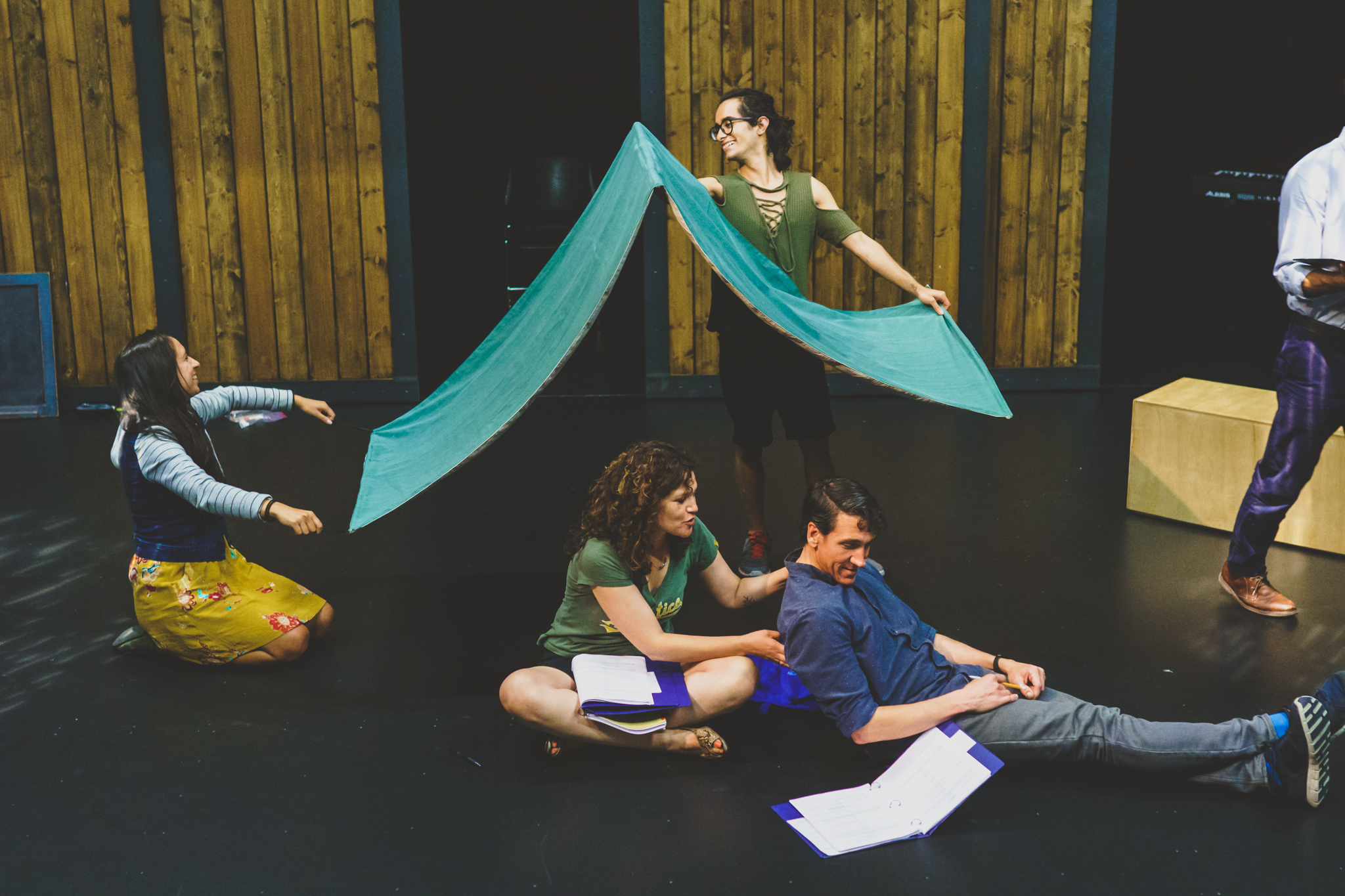
Two Big Black Bags cast members in rehearsal.
Photos by Mark Gladding
More shows!